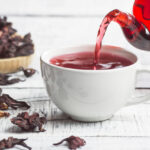New study shows hibiscus tea may help combat Alzheimer’s disease
 (NaturalHealth365) The hibiscus brings color and cheer to countless gardens with its eye-catching red blossoms and graceful green leaves. But this beloved garden plant may have an even more important gift to confer. Researchers report that it could contribute to the battle against Alzheimer’s disease.
(NaturalHealth365) The hibiscus brings color and cheer to countless gardens with its eye-catching red blossoms and graceful green leaves. But this beloved garden plant may have an even more important gift to confer. Researchers report that it could contribute to the battle against Alzheimer’s disease.
Alzheimer’s disease – which causes a sharp decline in cognitive powers, memory, and the ability to function – currently affects almost 6 million Americans. Sadly, rates are soaring, with the number of people affected by the disease predicted to triple over the next 30 years. Now, a new study from POSTEC (Pohang University of Science and Technology) reveals that a compound found in hibiscus tea may help rid the brain of harmful chemicals implicated in Alzheimer’s disease. Let’s take a closer look at this promising research.
Antioxidant found in hibiscus tea may combat inflammation in the brain
Conventionally speaking, Alzheimer’s disease is believed to occur when amyloid-beta proteins form harmful deposits in the brain tissue. To stave off damage, brain immune cells known as microglia attack and then engulf amyloid-beta in the brain, alleviating the cognitive impairments caused by Alzheimer’s disease. Unfortunately, this defense system can only work for so long.
Constant exposure to amyloid-beta eventually exhausts the microglia – leading to a chronic inflammatory state and damaging nerve cells. This, in turn, causes the cognitive decline and memory loss seen in Alzheimer’s disease. The researchers behind the new POSTEC study believe that an inflammation-fighting hibiscus flavonoid known as gossypetin could offer new ammunition in the battle against Alzheimer’s disease.
Gossypetin promotes microglia function, researchers conclude
In a new study published in the peer-reviewed journal Alzheimer’s Research and Therapy, researchers found that gossypetin promoted the activity of microglia. But there was more. The flavonoid also prevented the expression of genes associated with inflammation – while simultaneously increasing the expression of genes associated with amyloid-beta phagocytosis (the process by which microglia target, engulf and destroy amyloid-beta).
In this way, gossypetin enhances and promotes the clearance of amyloid-beta from the microglia. “Removing amyloid deposits from the brain is effective in preventing and treating dementia,” the team noted. Their encouraging conclusion? Gossypetin from hibiscus will contribute to the development of “safe and affordable” drugs for patients suffering from Alzheimer’s disease. Clearly, this is good news!
Discover a Simple and Effective Way to Remove Toxins: This is Jonathan's #1 choice for at-home detoxification. Special offer ends Feb. 16.
Antioxidant compounds in hibiscus tea offer even more health benefits
Gossypetin is not the only beneficial compound hibiscus has to offer. Hibiscus tea is also rich in antioxidant vitamin C, beta-carotene, and anthocyanins. A group of natural plant pigments found in fruits and vegetables such as blueberries and pomegranates, anthocyanins have been recognized for their potential to support cognitive health. One influential study suggested that a daily glass of blueberry juice helped to improve memory and cognition in older adults.
Hibiscus also has antibacterial properties. One cell study showed that a hibiscus extract inhibited pathogens such as E. coli – which can cause cramping, nausea, and diarrhea – while another demonstrated that it fought certain strains of bacteria more effectively than some pharmaceutical drugs. Hibiscus is also believed to boost immune defenses and promote heart health by lowering blood pressure, helping maintain healthy cholesterol levels, and supporting a healthy weight.
Reward yourself with a cup of flavorful, healthful hibiscus tea
You can make hibiscus tea by pouring 8 ounces of boiling water over a tablespoon of dried hibiscus flowers and steeping for 5 to ten minutes. Then cool, strain, sip, and enjoy. The tea will have a vibrant crimson color and a refreshing, somewhat tart taste that reminds many of cranberries. You can sweeten your beverage with raw honey, add lemon juice for extra flavor, or float raspberries or a sprig of rosemary on top. Many natural health experts advise drinking a cup of hibiscus tea a day.
If procuring and steeping hibiscus blossoms sounds like too much work, you can always buy hibiscus tea in convenient pre-packaged teabags, available online or at your favorite health food store. And, if sipping tea isn’t your thing, hibiscus extracts are available.
Hibiscus is considered generally safe when consumed as a food but check with your integrative doctor before adding hibiscus tea to your health regimen.
While more studies are needed, the new research suggests that sipping hibiscus tea may help support cognitive health into old age. So, sip away!
Sources for this article include:
CDC.gov
ScienceDaily.com
Healthline.com
ClevelandClinic.org
AlzheimersAsoociation.org



